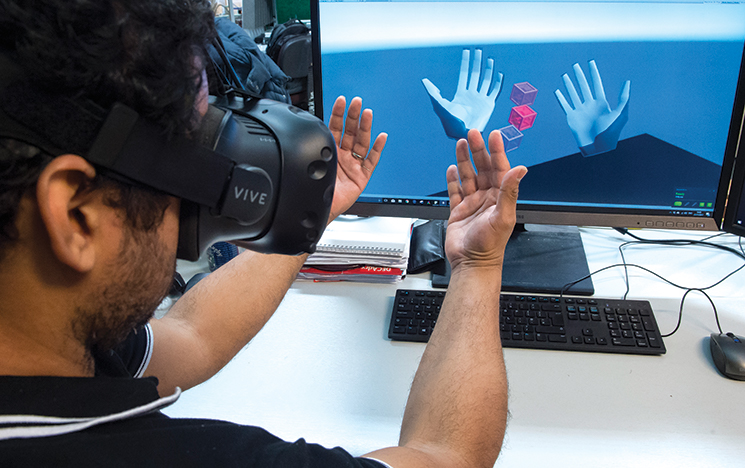Your future career
What to do with a Computer Science and Artificial Intelligence degree
From computer science and computing, to artificial intelligence courses – at Sussex, you can choose from a range of undergraduate, Masters and PhD degrees, as well as degree apprenticeships.

From the first intercontinental computer link in 1973 to today’s research into artificial intelligence and bio-inspired computing, we come up with creative solutions for the technology of tomorrow. You’ll study in our Future Technologies Labs and benefit from a student-focused hub, suites of high-spec computers, and new teaching and project workspaces. You’ll have the opportunity to study what interests you most, from machine learning to wearable and haptic interface devices.
If you have a passion for digital media, from video to games, you can combine a professional education in computing with specialised study of the technology for creating and communicating multimedia content. You’ll be in Brighton – a city at the forefront of the UK’s creative and digital industries.
The University of Sussex has played a foundational role in the field of AI. In 1974, philosopher Aaron Sloman, psychologist Alistair Chalmers and philosophical psychologist Margaret Boden founded a radical new interdisciplinary teaching programme. This became the influential School of Cognitive and Computing Sciences (COGS), where Geoffrey Hinton (often called the ‘Godfather of AI’) worked as a postdoctoral researcher.
Today the AI Research Group and the Sussex Digital Humanities Lab continue to lead research in these areas, and the AI Community of Practice fosters collaboration and excellence in the use of AI in education. Read more about our seven AI principles.
Paula: AI is the tool that guides our world at the moment.
Jack: I hope to change the world using AI by introducing virtual technologies that can assist people in doing their everyday tasks.
Paula: My research is focusing on trying to define error in a way where it reduces human bias. So, one example of that would be MRI imaging, where we're trying to make the details as understandable as possible.
Jack: I'm excited about people safe online by detecting hate speech, propaganda and misinformation using natural language processing techniques.
Joe: I'm looking into the application of AI in mental health care, and particularly around supporting clinicians to deliver treatment.
Maxine: At Sussex you'll study AI from philosophical perspectives, cognitive science perspectives, neuroscience perspectives and, of course, computer science.
Joe: The latest developments in AI are included in the syllabus, so it's been exactly what I had hoped to be able to maintain on the forefront of AI research.
Maxine: Sussex has an amazing history in AI. We've had Geoffrey Hinton here, Godfather of AI. We've had Margaret Bowden, who founded Cognitive Science. We've been interdisciplinary since the beginning.
Joe: We're not just thinking about building the best model, but actually how is this going to have an impact on the people that are going to be using it. I'm going to change the world, just a little bit, in AI, here at Sussex.
Could there be a better place to be a student than our beautiful campus? Nestled in the South Downs National Park, we’re just nine minutes from one of the UK’s most iconic cities.
To get a picture of life on our campus and the excitement of being in the city of Brighton, take our virtual tour.